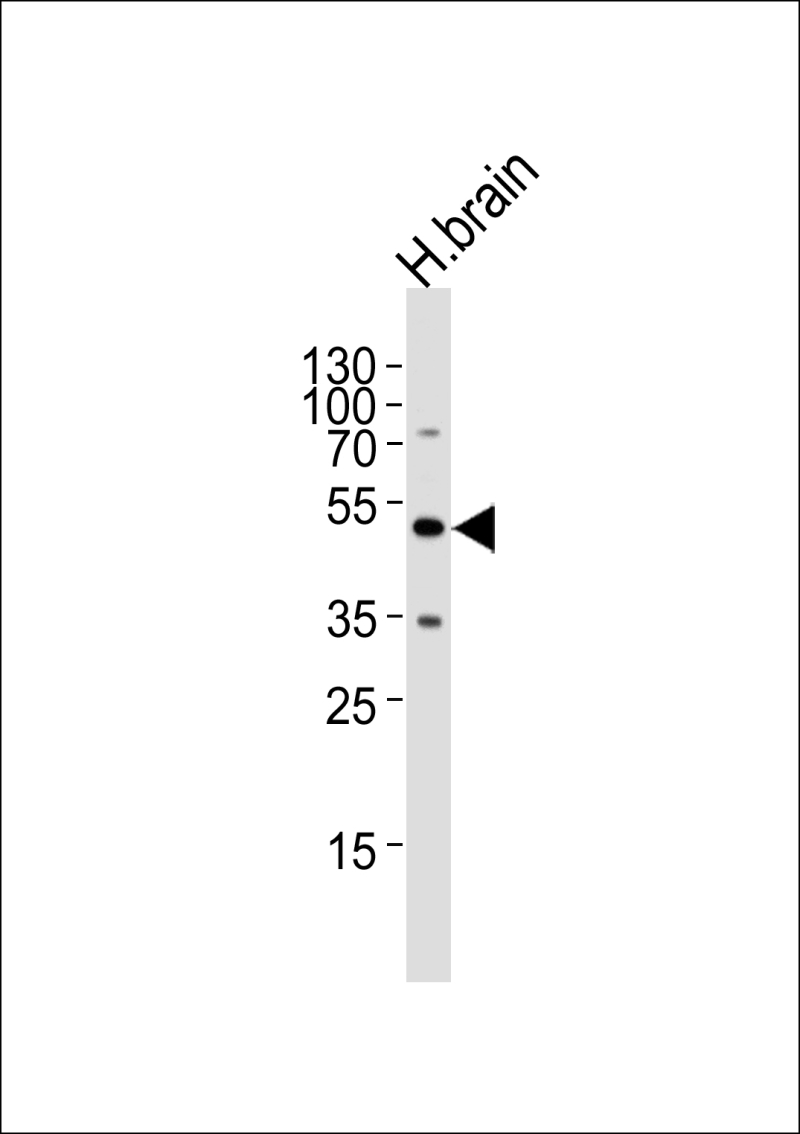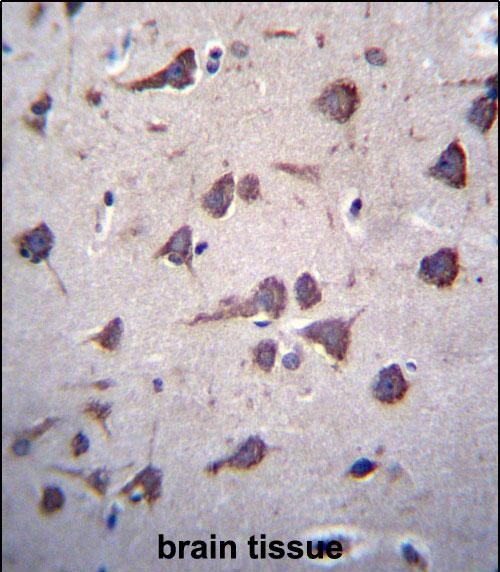

| WB | 1/1000 | Human,Mouse,Rat |
| IF | 咨询技术 | Human,Mouse,Rat |
| IHC | 1/100-1/500 | Human,Mouse,Rat |
| ICC | 技术咨询 | Human,Mouse,Rat |
| FCM | 咨询技术 | Human,Mouse,Rat |
| Elisa | 咨询技术 | Human,Mouse,Rat |
| Aliases | Fukutin, 2---, Fukuyama-type congenital muscular dystrophy protein, FKTN, FCMD |
| Entrez GeneID | 2218 |
| WB Predicted band size | 53.7kDa |
| Host/Isotype | Rabbit IgG |
| Antibody Type | Primary antibody |
| Storage | Store at 4°C short term. Aliquot and store at -20°C long term. Avoid freeze/thaw cycles. |
| Species Reactivity | Human |
| Immunogen | This FKTN antibody is generated from rabbits immunized with a KLH conjugated synthetic peptide between 177-206 amino acids from the Central region of human FKTN. |
| Formulation | Purified antibody in PBS with 0.05% sodium azide. |
+ +
以下是3篇与FKTN抗体相关的文献摘要概括:
1. **文献名称**:Fukutin is required for muscle membrane protein clustering and kinase activity in zebrafish
**作者**:Wood AJ, Müller JS, Jepson CD, Laval SH, Lochmüller H
**摘要**:研究利用斑马鱼模型,通过FKTN抗体进行免疫荧光和Western blot分析,发现FKTN缺失导致肌膜蛋白(如dystroglycan)异常分布,并影响相关激酶活性,揭示了FKTN在维持肌肉细胞膜稳定性中的作用机制。
2. **文献名称**:Antibody-based analysis of Fukutin in congenital muscular dystrophy patient tissues
**作者**:Kanagawa M, Toda T
**摘要**:该研究开发了特异性FKTN多克隆抗体,用于检测福山型肌营养不良症患者肌肉活检样本。结果显示患者中FKTN蛋白表达显著降低,且与α-dystroglycan糖基化缺陷相关,为疾病诊断提供分子依据。
3. **文献名称**:Subcellular localization of fukutin in cultured cells and its interaction with the dystrophin-glycoprotein complex
**作者**:Matsumoto H, Noguchi S, Hayashi YK
**摘要**:通过FKTN抗体进行免疫细胞化学和共聚焦显微镜观察,发现FKTN主要定位于高尔基体,并与dystrophin-glycoprotein复合物成员共定位,提示其在糖基化修饰中的功能性关联。
注:若需获取全文或具体细节,建议通过PubMed或Sci-Hub等平台输入标题或作者信息进一步检索。
FKTN (fukutin) antibodies are essential tools in studying the molecular basis of neuromuscular disorders linked to mutations in the *FKTN* gene. Fukutin is a glycosyltransferase involved in the post-translational modification of α-dystroglycan, a critical component of the dystrophin-glycoprotein complex that stabilizes muscle cell membranes and mediates interactions with the extracellular matrix (ECM). Defects in *FKTN* disrupt α-dystroglycan glycosylation, leading to congenital muscular dystrophies such as Fukuyama-type congenital muscular dystrophy (FCMD), limb-girdle muscular dystrophy, and other α-dystroglycanopathies. These conditions are characterized by progressive muscle weakness, brain abnormalities, and ocular defects.
FKTN antibodies are widely used in research to detect fukutin expression in tissues, assess its subcellular localization, and evaluate glycosylation status of α-dystroglycan in disease models. Commercial and custom antibodies target specific epitopes, enabling applications in Western blotting, immunohistochemistry, and immunofluorescence. They are crucial for validating *FKTN* knockout or knockdown models and screening therapeutic interventions aimed at restoring glycosylation pathways.
The development of FKTN antibodies has advanced understanding of ECM biology and neuromuscular disease mechanisms. Ongoing research focuses on gene therapy, enzyme replacement, and small-molecule approaches to address *FKTN*-related pathologies, with antibodies serving as key biomarkers for preclinical efficacy assessments.
×